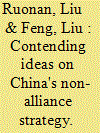|
|
|
Sort Order |
|
|
|
Items / Page
|
|
|
|
|
|
|
| Srl | Item |
| 1 |
ID:
145548


|
|
|
|
|
| Summary/Abstract |
China has frequently been depicted by some observers as an assertive rising power. However, assertiveness is neither a theoretically rigorous nor empirically useful term. The ‘assertive China’ thesis also makes a somewhat partial argument for China’s external behaviour by primarily focusing its responses on territorial disputes. A closer examination of China’s regional security strategy reveals that it is shifting from comprehensive reassurance to conditional reassurance, combined with active coercion towards specific target states. Overall, China’s strategic transition has occurred amid profound international and regional environmental changes. In particular, the rise of China has shifted the regional balance of power in China’s favour, the United States has strengthened its strategic involvement in the region, and neighbouring countries have developed substantial concerns about China’s role there. Owing to these external and internal variations, China has been more inclined in recent years to use its coercive power to persuade neighbouring countries or to ensure that they indeed treat it with respect, yet it still pursues a strategy of general reassurance to defend its rise.
|
|
|
|
|
|
|
|
|
|
|
|
|
|
|
|
| 2 |
ID:
153026


|
|
|
|
|
| Summary/Abstract |
As China’s rise continues to shape its role in international affairs, Chinese international relations scholars are engaging in a lively debate about the country’s grand strategy, particularly surrounding whether or not China should abandon the non-alliance strategy it has adopted since the early 1980s. Some scholars contend that a non-alliance strategy cannot safeguard China’s national interests in the face of the United States’ security alliance network throughout East Asia, and that without allies China’s rise will be contained by the US. Pro-alliance scholars, therefore, are especially favourable towards a formal alliance with Russia. However, orthodox scholars in favour of supporting the official position of non-alliance argue that a formal alliance deviates from the fundamental principles of independence and self-reliance that have historically guided China’s foreign policy. Moreover, a number of alternative strategies have been proposed to replace or complement the non-alliance strategy, among which are quasi-alliances, coalitions, and strategic partnerships. In practice, whether or not China forms alliances with other powers and neighbouring states depends on its self-defined role within the current international system, as well as its perception of external security threats. Considering both the external and internal constraints it faces, China is highly likely to maintain the non-alliance stance while pursuing other desirable approaches to making friends and partners.
|
|
|
|
|
|
|
|
|
|
|
|
|
|
|
|
|
|
|
|
|